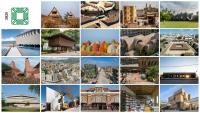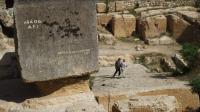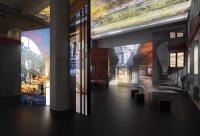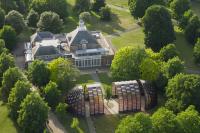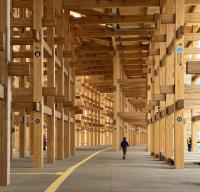BIG HQ
Copenhagen, Denmark
At the tip of Sundmolen in Copenhagen, BIG’s new 4,488 m2 headquarters stands among warehouses and maritime infrastructure. Completed in the spring of 2024, the HQ is one of the studio’s first realized examples of BIG’s integrated LEAPP approach – a collaboration between BIG’s internal Landscape, Engineering, Architecture, Planning, and Product Design teams. The building is made of Uni-Green concrete developed in close collaboration with Unicon.
Located on a narrow pier in Copenhagen’s Nordhavn neighborhood, BIG's new headquarters is a 27-meter-tall, 7-story structure, anchored in the harbor’s industrial heritage. Following two years of construction in collaboration with LM Byg, Unicon, Energy Machines, El-Team Vest, Eiler Thomsen, and HB Trapper, the building is the home of BIG's 300 Copenhagen-based employees. Designed to achieve DGNB Gold, the building integrates solar and geothermal energy systems that contribute to a 60% reliance on renewable energy. Combined with passive design strategies such as natural ventilation, the geothermal energy system provides 84% of the building’s heat demand and 100% of the cooling demand.
The building embodies the first application of Uni-Green concrete, developed in collaboration with Unicon, where a portion of the cement clinker is replaced with calcined clay and lime filler, representing a CO2 reduction of approximately 25% compared to an equivalent traditional concrete mix. Tested and developed during construction, BIG HQ stands as a testament to the durability and potential of Uni-Green, as well as a pioneer project not only in terms of materials, but also in building methods - pushing the boundaries for the possibilities of concrete.
“The idea behind LEAPP is an architecture practice as a renaissance, interdisciplinary body of people and knowledge - LEAPP being the acronym for Landscape, Engineering, Architecture, Product, and Planning. Every single aspect of LEAPP has been involved in our HQ, including the planning, the product design, the very complex stacking of the concrete elements. Because of the way it’s engineered, it only holds one column in the whole building. A series of Scandinavian granite and marble are stacked between the beams and everything else is these concrete walls resting on each other. Every floor has access to an outdoor terrace that is connected to the outdoors terrace above and below. One of the means of egress is that you can walk all the way from the roof to the ground floor. This creates incredibly framed views as you move through the building – sometimes you see a fragment of the Nordhavn community, sometimes you see a frame of the water, sometimes a framed view of the windmills at Middelgrunden.” - Bjarke Ingels, Founder and Creative Director, BIG – Bjarke Ingels Group
Upon entering the main entrance through a 3-meter-tall glass door, BIGsters and guests will find themselves in a Piranesian space, where the inner life of the building reveals itself through diagonal views all the way up to the top floor, led by a zig-zagging central staircase of blackened steel, connecting all seven floors both visually and physically.
A single load-bearing stone column of six different types of rock – ranging from dense granite at the bottom to a porous marble at the top – forms a totem pole to gravity at the heart of the open space that rotates on each floor to align with the beam that it’s carrying.
On the facade, a 140-meter-long staircase spirals around the building from the roof to the quayside, providing each floor with an outdoor terrace while allowing movement between floors along the exterior of the building. The staircase doubles as the additional fire escape freeing up the interior from the obstruction of the traditional core.
An elevator, vertical risers, and a smaller, secondary egress staircase are moved to the north edge of the building, leaving the work areas as open as possible, including both the model shop and meeting rooms, where they can take advantage of the increased light.
At the foot of the building, BIG Landscape has transformed a former parking area into a 1,500 m2 public park, inspired by the sandy beaches and coastal forests of the Danish landscape. Towards the north, native forest trees, such as pines and oaks, protect against the harsh winds of the harbor. Towards the south, areas with planting, rocks and woods are created to support habitat creation for biodiversity as well as a soft surface for play and relaxation.
Tucked away between the trees, a sculpture by American artist Benjamin Langholz titled "Stone 40" will surprise and engage visitors of all ages. The sculpture consists of 40 stones arranged in a spiral form, acting as a playful path that challenges the senses.
Along the outside staircase wrapping around the HQ, wind-tolerant species of trees, shrubs, perennials, and herbs are planted, with the herbs used by chefs in the studio’s canteen. The rooftop terrace, paved with wood from a local sawmill, continues the park’s theme of natural materials to create a holistic connection between urban space and architecture, while offering employees and guests a unique view of the city and the water.
“At the tip of Sundmolen in Nordhavn, we’ve transformed what was once a parking lot into a 1,500 m² beach park—a hidden gem in the heart of the city. Inspired by Denmark’s beautiful coastal landscapes, we envisioned a place where people can relax, play, fish, and connect with nature. The park reflects what would have naturally grown here before the harbor emerged, making it an homage to both the past and future. By preserving the site’s industrial character and merging it with the Danish coastal landscape, it offers a living space where nature and people thrive together. We hope it becomes a lasting part of visitors’ memories and an example of inhabitable nature.” - Giulia Frittoli, Partner and Head of BIG Landscape, BIG - Bjarke Ingels Group
- Arquitectos
- BIG – Bjarke Ingels Group
- Localização
- Copenhagen, Denmark
- Ano
- 2024
- Cliente
- BIG - Bjarke Ingels Group
- Equipa
- Bjarke Ingels (Partner in Charge), Finn Nørkjær (Partner in Charge), Ole Elkjær-Larsen (Project Manager), Frederik Lyng (Design Lead), Jesper Boye Andersen (Project Architect), Annette Jensen, Justas Zabulionis, Hanne Halvorsen, Alda Sol Hauksdóttir, Jesper Boye Andersen, Gabrielle Nadeau, Lisbet Fritze Trentemøller, Tobias Hjortdal, Fabiana Cortolezzis, Maria Natalia Lenardon, Sergiu Calacean, Lenya Schneehage, Steen Kortbæk Svendsen, Katrine Juul, Mads Enggaard Stidsen, Kaja Terze, Eddie Chiu Fai Can, Mathieu Jaumain, Jannik Albæk, Matthew Thomson, Felicia Olofsson, Helen Shuyang Chen, Mads Primdahl Rokkjær, Arthur Martinevski, Ewa Zapiec, Snorre Emanuel Nash Jørgensen, Marius Tromholt-Richter, Kresimir Blazina, Magni Waltersson, Atibadi Brugnano, Graham Forrest Jordan, Ioannis Mathioudakis, Yunyoung Choi, Dobrochna Anna Klimczak, Shu Zhao, Joos Jerne, Narisara Ladawal Schröder, Mikkel M. R. Stubgaard, Søren Martinussen, Kim Lauer, Lone Fenger Albrechtsen, Jonas Høgh Rask, Tommy Bjørnstrup, Kanetnat Puttimettipanan, Celia de la Osa Muñoz, Anne-Charlotte Wiklander, Helena Hammershaimb, Danyu Zeng, Guoyu Liu, Thor Larsen-Lechuga, Filip Jacek Rozkowski, Irie Annik Meree, Anna Wozniak, Høgni Laksafoss, Jonathan Otis Navntoft Russell, Jiewei Li, Frederik Skou Jensen, Luca Pileri, Margarita Nutfulina, Gül Ertekin, Aya Fibert, David Zahle, Paula Madrid, Xingyue Huang, Andreas Klok Pedersen, Yehezkiel Wiliardy, Omar Mohamed Nabil Mohamed Saad Mowafy, Alexandra-Madalina Nita, Petra Hajdu, Johan Frederik Lindqvist, Mariana De Soares E Barbieri Cardoso, Marah Wagner, Xinying Zhang, Jakob Lange, Martyna Kloda, Nandi Lu, Henrik Jacobsen, Bart Ramakers, Celina Holck, Mussa Algasra, Andrea Angelo Suardi, Xavier Thanki, Agla Egilsdottir, Eddie Can, Andrea Megan Hektor, Tim Christensen, Alexander Gale Heiede, Jesus Fernandez Fraile, Kai-Brith Kalda, Thomas Lejeune, Andreas Bak, Kannan Selvaraj, Jonathan Otis Nanvtoft Russell, Tore Banke, Sille Foltinger, Alexander Matthias Jacobson, Giulia Frittoli, Ulla Hornsyld, Louise Mould, Anders Fønss, Brian Malig Collado, Christian Kuczenski, Ahmed Badra, Anna Bertolazzi, Anna Lindgaard Jensen, Barbora Hrmova, Bartlomiej Lew, Dina Brændstrup, Fernanda Furuya, Giulia Genovese, Ines Zunic, Jialin Liang, Jonathan Udemezue, Juhye Kim, Kristian Mousten, Milan Moldenhawer, Xinyi Chen, Lars Thonke, Michael James Kepke, Louise Brøndbjerg, Mathilde Jeppesen, Marija Cvijovic
- Collaborators
- LM Byg, Aalborg Portland, Centrum Pæle, Connex, El Team Vest, Energy Machines, Skel.dk, Paschal Stillads, Kjellerup VVS, HB Trapper, Eiler Thomsen, Deko, Brønnum, Primatag, Optimus, Krak Bau, Alt om Fugning Aps, YOUR PARTNER, Kvadrat Acoustics, GOTESSONS,
















